 Study: Residential Solar PV Market in Wisconsin
Study: Residential Solar PV Market in Wisconsin
This report is a study written by Sai Mounika Chennamsetty looking at the potential residential solar market in Wisconsin and the policies affecting it. The paper specifically takes a look electricity rates and mandatory fixed fees charged by utilities and how this changes the payback period for solar arrays.
The second part of the paper examines how specific state policies can promote or slow the solar market in Wisconsin and makes suggestions. Comparisons are made between Wisconsin and Maryland, New York, and New Jersey. The report finds that Wisconsin has a much larger technical potential for solar than we are currently taking advantage of.
- View the study.
 Summary of Public Comments during MGE’s Community Energy Workshop
Summary of Public Comments during MGE’s Community Energy Workshop
MGE’s Community Energy Workshop on April 19th, 2016 did not include a thorough analysis of public comments. At first, MGE released only a summary from the comments collect that evening. Seven months later, MGE released the full list of comments along with their own report. RPM’s co-chair, Nancy Korda, analyzed these comments.
This report found that MGE customers want more outreach and information from the utility, and they want Energy 2030 to be more ambitious and forward-thinking. They want MGE to explain what it plans to do and when, and they want to know how they can contribute to future success.
- View the report
- View the letter to MGE’s CEO Jeffrey Keebler accompanying the report
- View the spreadsheet with data categorizing public comments from MGE’s workshop
- See also our earlier report below, “An Analysis of Customer Comments…“, from phase II of MGE’s Community Conversations
MGE’s Community Conversations: Where We Go From Here, April 2016
This paper by Kevin Myers, provides a summary of themes that emerged from a number of community meetings with MGE ratepayers. The first and foremost finding is that over 70% of the participants in the community meetings want MGE to increase investments in renewable energy sources. MGE’s customers are also overwhelmingly against any future efforts to raise fixed fees on bills. Myers also provides a roadmap on the continuing process of public engagement between MGE and its customers.
 Great Things That MGE Could Do, April 2016
Great Things That MGE Could Do, April 2016
RePower Madison thinks that MGE could be more ambitious. We offer here in this short and sweet factsheet some amazing things that MGE can do to truly show leadership. We cover progressive ratemaking, distributed generation policies, reduction in Madison’s dependency on fossil fuels, and form a true community partnership to assist in rate proposals and clean energy planning.
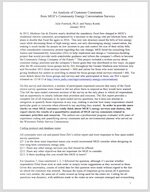 An Analysis of Customer Comments from MGE’s Community Energy Conversation Surveys, January 2016
An Analysis of Customer Comments from MGE’s Community Energy Conversation Surveys, January 2016
This report by Julie Foertsch, Ph.D. and Nancy Korda, digs deep into the questions and answers that MGE’s customers provided during MGE’s community outreach in 2015. MGE hired the consulting firm Justice and Sustainability Associates (JSA) to run the project of gathering input from the community. The project included a written survey about customer energy priorities and the company’s future goals with an open ended comment section. The JSA summary report provides a complete list of all responses to its open ended survey questions, but it does not attempt to categorize or quantify those responses in any way, making it unclear how many respondents shared particular goals or concerns when allowed to say anything they wanted
In order to provide more clarity on what MGE customers really think about MGE’s energy services and choices, this report shows the results of a quantitative analysis of MGE survey comments related to customer priorities and concerns. The authors are a professional program evaluator with years of experience coding and quantifying survey comments and an environmental planner who served on the Wisconsin Public Service Commission.
 RePower Madison on Community Energy Partnerships and Conversations
RePower Madison on Community Energy Partnerships and Conversations
RePower Madison has released a easy to read, one-page guide to help community members understand the details of MGE’s Community Energy Partnership (CEP). A CEP is a decision-making structure that gives utility customers and community representatives a role in determining how our power is produced, distributed, and priced. The guide addresses what the partnership should look like and why the partnership is needed. There is also a summary of the Minneapolis model of a utility/community partnership.
- What is a Community Energy Partnership? – RePower Madison, 2016
- Summary of the Community Energy Conversations – RePower Madison, 2015

MGE-Community Energy Workshop: Handout to Attendees, April 2016
This is a multiple page handout MGE provided to those who attended the Community Energy Workshop. The handout covers Energy 2030, New Products and Services, and Community Engagement.
- View Report
 Community Energy Conversations Phase II Report, December 2015
Community Energy Conversations Phase II Report, December 2015
The following report by Justice and Sustainability Associates summarizes Phase II of the community engagement process — specifically, the Community Energy Conversations (CECs) held across Madison from July into early November 2015. JSA describes the methodology of the Conversations, quantitative and demographic data gathered, and offers key findings from the CECs.
- Download the report
 Empowered: A Tale of Three Cities Taking Charge of their Energy Future, October 2015
Empowered: A Tale of Three Cities Taking Charge of their Energy Future, October 2015
Impatient with the slow pace of change with clean energy policy at the state level, an increasing number of cities are taking matters into their own hands as their citizens seek energy that is local, affordable, and clean. The new book by Ben Paulos describes how city officials and activists in Madison, Boulder, and Minneapolis are fighting back against entrenched utilities, and taking charge of their energy future.
- Download the book – PDF or Amazon download.
- Learn more about the book here, from the publisher Midwest Energy News.
 The Coal Truth, May 2015
The Coal Truth, May 2015
RePower Madison has released The Coal Truth report to help inform Madison Gas and Electric’s shareholders and the Madison community about MGE’s reliance on polluting and expensive coal power. The Coal Truth report is based on public documents and statements from MGE and other experts regarding the utility’s deep commitment to coal. MGE has the highest commitment to coal, and the highest rates, of any Wisconsin utility.
- Download the Report – May 2015
- View the Press Release – May 18, 2015
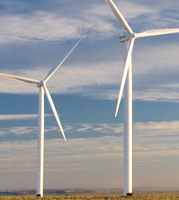 Resource Media’s Fixed Fee Resources, 2015
Resource Media’s Fixed Fee Resources, 2015
In 2013, energy expert Peter Kind urged electric utilities to increase the mandatory monthly fees charged to customers. In November 2015, he issued a course correction saying mandatory monthly fixed fees have , “. . . several policy flaws — principally that such an increase would remove price signals needed to encourage energy efficiency and efficient resource deployment….”
This web page is a clearinghouse for relevant information that journalists, policymakers, regulators, advocates and other interested parties can access to stay abreast of developments on this issue.
 Madison Gas & Electric’s Billing Scheme at a Glance, 2015
Madison Gas & Electric’s Billing Scheme at a Glance, 2015
A one page handout by RePower Madison outlining the impacts of the what MGE calls the “Grid Connection and Customer Service Charge,” the fee ratepayers pay before any energy is used. In 2014, MGE proposed a radical increase to these mandatory fees, which was met with broad community opposition, but approved by the Wisconsin Public Service Commission (PSCW) and went into effect on January 1, 2015.
 Economic Concerns About High Fixed Charge Pricing for Electric Service, May 2015
Economic Concerns About High Fixed Charge Pricing for Electric Service, May 2015
This 2015 summary of economic pricing principles related to electric utilities was prepared by Steve
Kihm, an economist with 35 years of experience in the field of utility regulation, including more than 20 years as an analyst at the Wisconsin Public Service Commission. His work has been published in the Energy Law Journal, The Electricity Journal, the Journal of Applied Regulation and Public Utilities Fortnightly, as well as reported in Forbes and the Wall Street Journal. He is also Senior Fellow at Michigan State University’s Institute of Public Utilities.
 Coal Addiction: MGE’s Real Problem, October 2014
Coal Addiction: MGE’s Real Problem, October 2014
Electrical utilities in Wisconsin are supposed to be regulated by the Public Service Commission of Wisconsin to ensure that monopoly utilities do not take advantage of captive customers when they build or retrofit coal power plants. RePower Madison, formed to promote sustainability in MGE’s service territory, recently convened energy experts to research and analyze publicly available construction applications for the Columbia and Elm Road coal plants to help the public understand the truth about MGE’s coal problem.The results are startling.
 Presentation by Michael Vickerman, Renew Wisconsin, at Repower Madison’s Public Forum – September 15, 2014
Presentation by Michael Vickerman, Renew Wisconsin, at Repower Madison’s Public Forum – September 15, 2014
What impact has solar net metering had on MGE rates? Renew Wisconsin responds, “There are fewer than 200 net metering customers with either current DG or completed applicatons and the net effect of the cost shift on MGE’s other customers is relatively small…. If there is a theoretical problem here–and we are not convinced there is one—it certainly hasn’t scaled to a level where it can be demonstrated with numbers along with words.”
 Selection of Expert Testimony from MGE Rate Proposal Docket, September 2014
Selection of Expert Testimony from MGE Rate Proposal Docket, September 2014
Testimony of Pamela Morgan, Natural Resources Defense Council – September 2014
– Key Excerpts
– Full Testimony
Testimony of Bill Marcus, representing the City of Madison – September 2014
– Key Excerpts
– Full Testimony
 Madison Gas & Electric – Moving our Energy Future Backwards – Don Ferber, September 2014
Madison Gas & Electric – Moving our Energy Future Backwards – Don Ferber, September 2014
What do you want Madison’s energy future to be? Do you want one with reduced energy use, where we rely on infinite sources of distributed renewable energy such as wind and solar, and we bring our CO2 down to sustainable levels, or do you want one tied to centralized power plants, a continued reliance on coal and other fossil fuels, and 450 or 500 or more ppm of CO2? The latter option is what we’re being given by MGE with their rate case proposal before the Wisconsin Public Service Commission (PSC). And MGE is not alone. Two other utilities in Wisconsin, WE Energies and Wisconsin Public Service, also have regressive rate cases before the Public Service Commission that would significantly increase the fee you pay for being connected to the grid before you use any electricity. These proposals would also negatively impact energy efficiency and solar installations and increase energy and fossil fuel use.
- Download Report
- Presentation on MGE Proposal Given to UW Students – by Rob Stupar, September 2014
- MGE Rate Case Backgrounder – August 2014
- MGE Rate Case Flyer – August 2014
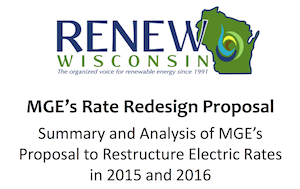 Presentation on MGE Proposal With Analysis – RENEW Wisconsin, July 2014
Presentation on MGE Proposal With Analysis – RENEW Wisconsin, July 2014
RENEW Wiisconsin prepared a summary and analysis of MGE’s recent proposal to change it’s rate structure. The first part discusses how MGE’s electric utility bills are structured. The second part addresses rate structures and price signals in a utility style service. From there, the third part discusses the likely effects of MGE’s proposal to restructure charges and rates on low energy users, energy efficiency and solar generating customers.
- View Presentation on MGE Proposal With Analysis
 Benchmarking Utility Clean Energy Deployment 2014 – CERES, July 2014
Benchmarking Utility Clean Energy Deployment 2014 – CERES, July 2014
Benchmarking Utility Clean Energy Deployment assembles data from more than 10 sources, including state Renewable Portfolio Standard (RPS) annual reports, U.S. Securities and Exchange Commission 10-K filings and Public Utility Commission reports, to show how 32 of the largest U.S. investor-owned electric utility holding companies stack up on renewable energy and energy efficiency.
- Download Report
 The Future of the Utility Industry and the Role of Energy Efficiency – ACEEE, June 2014
The Future of the Utility Industry and the Role of Energy Efficiency – ACEEE, June 2014
This study estimates future electric sales under several scenarios, concluding that in the coming two decades sales will either be level, increase modestly or decrease modestly. Even under the most extreme case examined we find that a “death spiral” is unlikely. This study also reviews more than 50 studies and papers on the future role of utilities, identifying 19 options for the future and describing and evaluating each of them. Based on this review we make recommendations for the short, medium and long-terms including on the role of energy efficiency in the utility of the future.
- Download Report
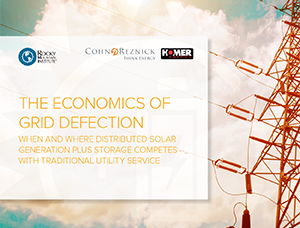 The Economics of Grid Defection – Rocky Mountain Institute, May 2014
The Economics of Grid Defection – Rocky Mountain Institute, May 2014
Distributed electricity generation, especially solar PV, is rapidly spreading and getting much cheaper. Distributed electricity storage is doing the same, thanks largely to mass production of batteries for electric vehicles. Solar power is already starting to erode some utilities’ sales and revenues. But what happens when solar and batteries join forces? Together they can make the electric grid optional for many customers—without compromising reliability and increasingly at prices cheaper than utility retail electricity. Equipped with a solar-plus-battery system, customers can take or leave traditional utility service with what amounts to a “utility in a box.”
- Download Report
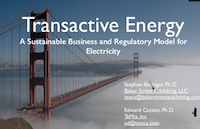 Transactive Energy: A Sustainable Business and Regulatory Model for Electricity – Baker Street Publishing, September 2013
Transactive Energy: A Sustainable Business and Regulatory Model for Electricity – Baker Street Publishing, September 2013
This presentation introduces the Transactive Energy concept and provides an overview of how it can be implemented. Transactive energy systems are based on buy and sell transactions of energy among parties that consume, produce, store, and transport electric energy. Parties can include end users owning energy consuming devices, storage and generation; central generation owners; and distribution and transmission grid operators.
- View Presentation


